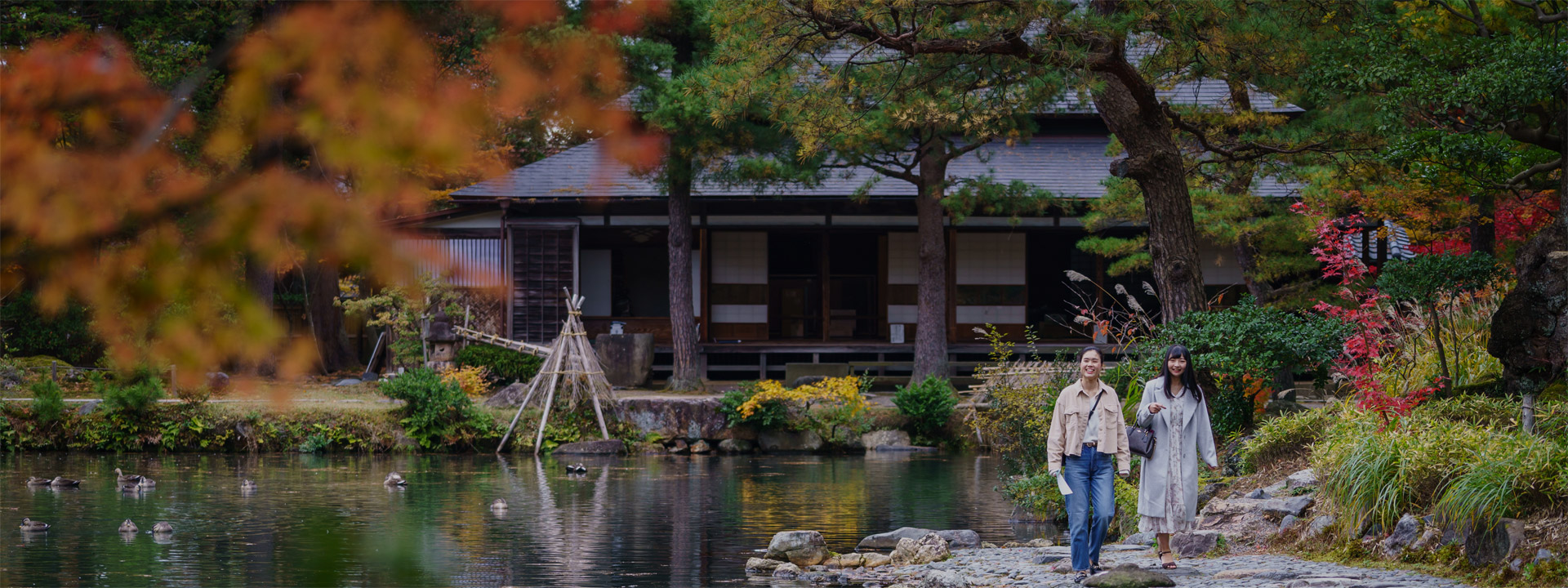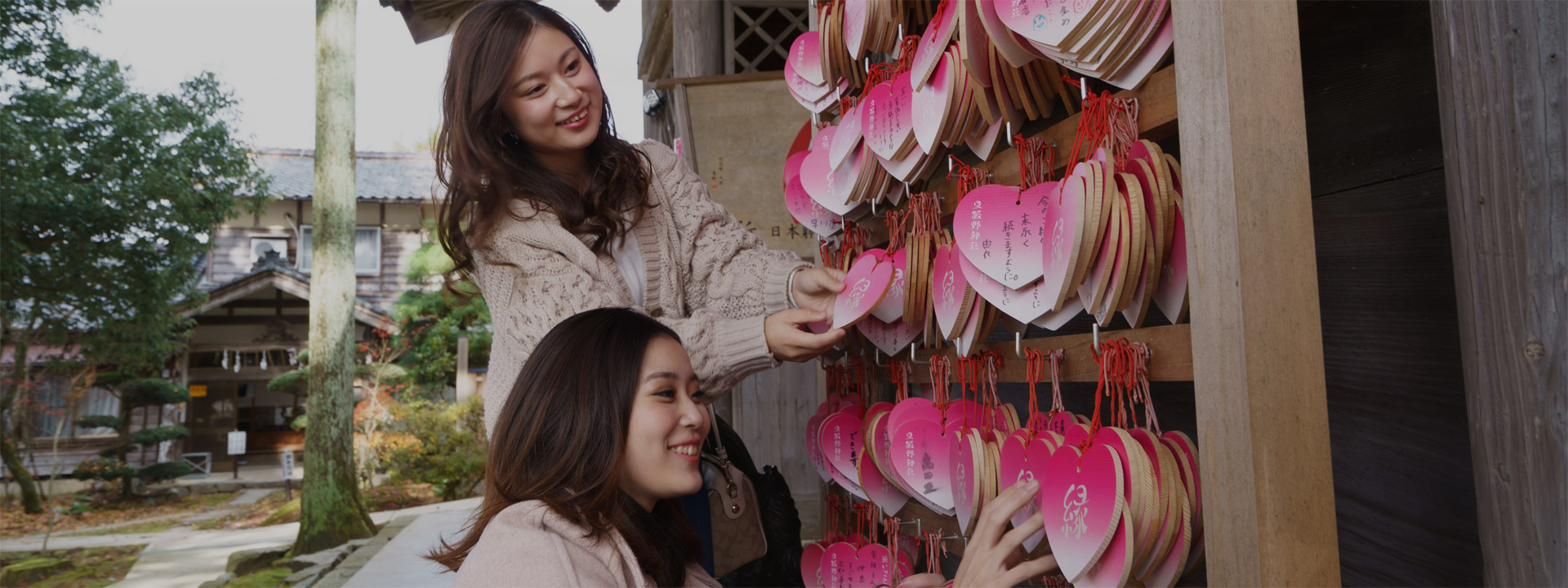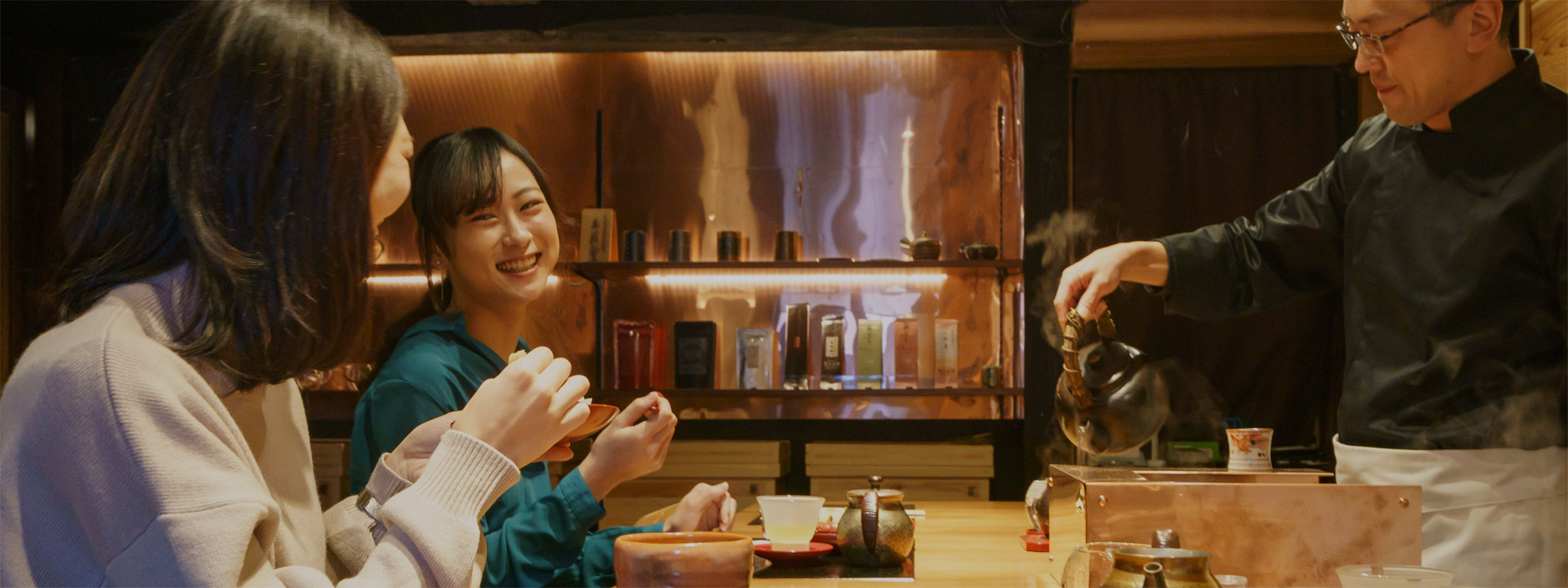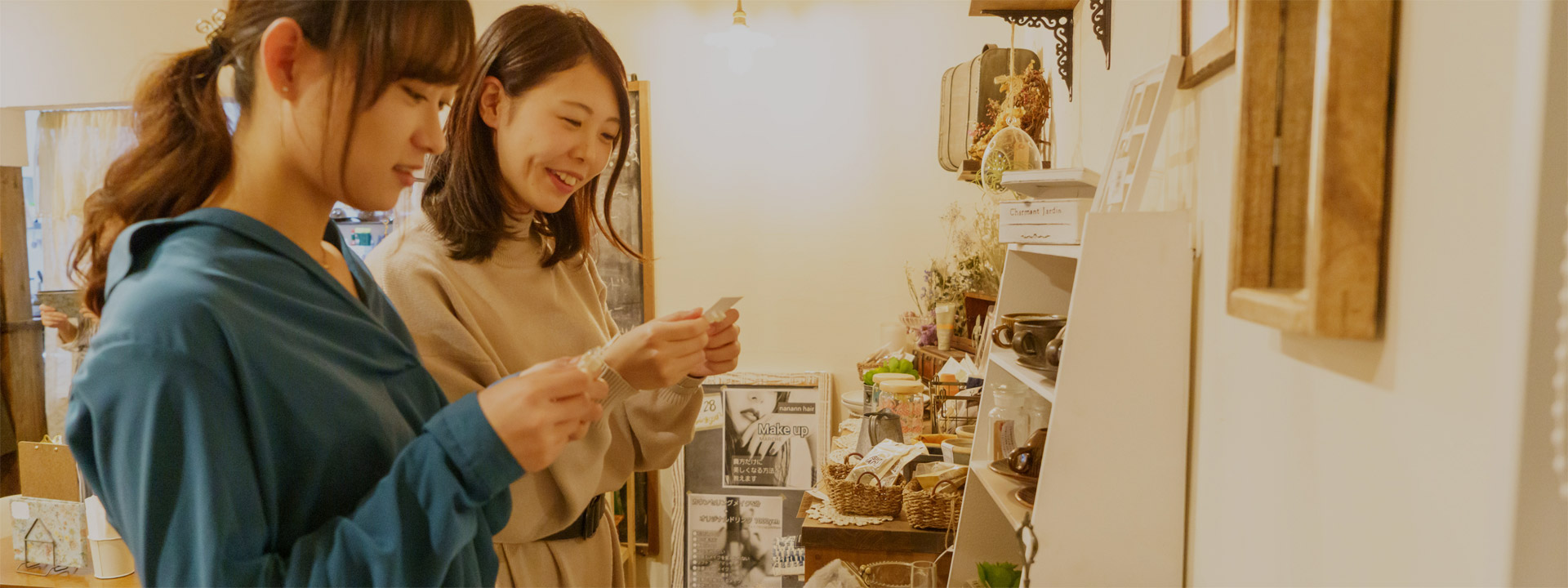



Visit a beautiful Japanese garden and temple and a facility where you can have fun learning about Japanese sake. There are also places along the way to grab lunch or a snack.
 Kikusui Sake Culture Institute(20 minutes by car from Tsukioka Onsen)
Kikusui Sake Culture Institute(20 minutes by car from Tsukioka Onsen)Kikusui Sake Culture Institute is a facility where the Kikusui Shuzo, which is known for the 'Funaguchi Kikusui Ichiban Shibori', has valuable Sake cups, books, and old magazines open to the public. 'Uguisu tokkuri' which is said to be popular in the Edo period (1603-1868), is a very stylish dish that makes a cute bird sound when pouring. In an age without the Internet, you will be surprised at the ingenuity of Japanese people who want to enjoy drinking. It is a space that anyone can enjoy with various elements such as food, art, local culture, advertisement, etc., as well as alcohol. A knowledgeable staff will show you around and you will enjoy a lively conversation. The shop where you can taste has 'Funaguchi Kikusui Ichiban Shibori Namagenshu' that is only available at the stand. They will bottle it in front of you after taking your order, so you will surely get excited.
More Shimizuen
ShimizuenShimizuen was built in the mid-1600s as a villa for the Mizoguchi family, the lord of Shibata. The highlight is the Japanese garden which is designated as a national scenic beauty. There are teahouses and stone bridges around the large pond, and it was built based on the idea of 8 scenic spots around Lake Biwa 'Eight Views of Omi'. If you walk around, you can see different aspects of the garden depending on the angle. You can enter the Shoin-zukuri house, so let's come in. It is a space where you can feel the history, and time flows slowly and quietly. You have a chance to see volunteer guide most of the time, so it's a good idea to listen to them.
More Komegura Cocoro
Komegura CocoroThe cafe restaurant 'Komegura Cocoro' in Shimizuen is a renovated space from a 150-year-old storehouse that was actually used to store rice. The owner who used to run a restaurant in front of Shibata Station recommends 'Stone Pot Oyster Bibimbap' (1,200 yen including tax), which has been a popular menu since then. There are large oysters from Hiroshima and Ako in Hyogo and the rich flavor goes well with salty-sweet sauce. The 'Wheat gluten cutlet rice bowl' (1,020 yen including tax) that uses the familiar 'Kuruma-fu (Round shape dried wheat gluten)'' in Shibata is a new type of Tonkatsu that is fried crisply with pork wrapped around wheat gluten. The outside is crispy, the inside is soft and juicy, and the curry-flavored sauce makes it easy to eat. There are plenty of craft beer and wine from Niigata, and the alcohol you drink in the storehouse has a special taste.
More Teramachi (Temple) Street
Teramachi (Temple) StreetJust outside of Shimizuen garden is the 'Teramachi dori Street' which has 9 temples lined up. There is a moat at the foot of the sidewalk and clean water flows. 'Teramachi Tamari Eki' which is café and rest area is located on a street lined with temples. 'Shibatakko Daiwa' which appears in the summer festival of Shibata, is exhibited in the facilities. You can have lunch, light meals such as Rice ball sets, Oshiruko (sweet red-bean soup) and French toast, and buy local specialties. You can also see special foods like 'Shibata fu (Dried wheat gluten)'' which is familiar to locals, and 'Rengyou Tea' made from yellow flower leaves called Rengyou (golden bell flower).
More Obanyaki Kumakura
Obanyaki Kumakura A small shop 'Obanyaki Kumakura' is in a residential area. The product consists of 3 types (120 yen to 240 yen including tax each): the most popular 'Obanyaki', also popular 'Kingyodaiwa-yaki' shaped like the Shibata festival's goldfish float, and crispy texture 'Kingyodaiwa-yaki croissant style'. There are a variety of fillings such as red bean paste, cream, caramel, strawberry cream, banana cream, etc., and there are also a mix of red bean paste and cream, cheese and red bean paste, etc., so you can't decide. Obanyaki is a fluffy and soft pastry, and Kingyodaiwa-yaki has a crispy and light pastry. It is full of cream to the end and filling. It would be good memory the smile of the owner who said 'The cream inside is hot, be careful!' many times.
More Sugatan-Fudouson Kankokuji
Sugatan-Fudouson KankokujiSugatan-Fudouson Kankokuji has a legend that was built about 800 years ago, Heian period. When you go through the temple gate, there is a large main hall with a solemn atmosphere. After you pray the temple, you walk to the back of the main hall. There is a small waterfall called 'Mitarashi Falls'. It is said that when the temple was destroyed by fire in the past, only the principal image was protected by many 'Tanishi(River snail)'' who lived in the waterfall. From that fork tale, they dedicate Tanishi to the waterfall basin. It is said that pouring water on Takifudo(Acala) make your wish come true, and it is loved by many people. The water has been passed down for a long time as a spiritual water good for eye diseases.
More


Delicious food and power spots are essential for women's travel.
Agano City where popular spots gather in a small area is good for them.
 Asaiino Shrine(15 minutes by car from Tsukioka Onsen)
Asaiino Shrine(15 minutes by car from Tsukioka Onsen)Asaiino Shrine has a history of about 1700 years, and is said to bring blessings for a safe delivery, pregnancy and love fulfillment. One of the symbols is a large round stone behind the main shrine. Instead of being shaved and rounded in the river, it was dug out in a round shape from the nearby sacred mountain. It was passed down as a powerful amulet, and since its round shape reminds us of a pregnant woman's stomach, it was believed to bring good luck to women. 'Please stroke this stone and make a wish.'' says Shinto priest. By the way, Omikuji (fortune slip) and Fukuame (fortune candy) at the front shrine are free from the idea of 'receive from divine'. Please get those with gratitude.
More Chocolatei Hyoko lake brunch
Chocolatei Hyoko lake brunchThis is a chocolatier shop that pursues a new taste by fusing Japanese ingredients and chocolate. There is also a cafe corner in the renovated old house where you can enjoy chocolates and drinks while looking at Lake Hyoko that is well known for water birds such as swans. The popular 'Terrine set' (1,200 yen including tax) is an assortment of 2 types of terrine chocolate, Kirinzan Daiginjo with the aroma of Japanese Sake and slightly bitter green tea, and is recommended for adults. You can enjoy 4 kinds of 'Fresh Chocolate Set' (1,100 yen including tax) from Yukiguni black tea, Matcha (Powdered green tea), Vanilla, Yuzu, Japanese Sake and Roasted green tea. It will be a new experience to eat chocolate with chopsticks in a retro Japanese space. Terrine, Fresh chocolate and other sweets are also suitable for souvenirs.
More Kawara terrace
Kawara terraceKawara terrace is a facility where you can see, know the traditional Yasuda tiles. And you can have several foods at there. The sight of 12000 tiled roofs lined up on a white-walled building is amazing, and taking pictures on the stage overlooking the roofs is the best spot. The restaurant serves 'Agano Yume Unagi-don' (2,500 yen including tax) with plenty of local eels and 'Aganohime beef roast beef rice bowl' (1,400 yen including tax) with local brand beef. Ramen made with soup stock from eel bones is also popular. The bowl made of tile material has a nice touch and excellent heat retention, so you can keep it hot until the end. The cafe and shop area next door are good for taking a break and finding some local specialties.
More Y&Y Garden(Y&Y Garden)
Y&Y Garden(Y&Y Garden)This store is directly managed by 'Yasuda Yogurt', so it is the best for those who like dairy products. There is a lineup of rich taste drink yogurt, soft serve ice cream and baked sweets made with plenty of fermented butter, and hand cream containing the beautiful skin ingredient 'whey'. The rich taste soft serve ice cream (300 yen including tax) has a secret. While regular soft serve ice cream mixes with air, this one doesn't add air so you can enjoy the rich taste. Another popular product Yogurt waffle (190 yen including tax) also has a rich taste and gentle sweetness. On the whole, these reasonable prices are based on the president's belief that 'I want a lot of people to have fun'. You can’t help eating them on the spot or buying several things as a souvenir. Be careful not to buy too much.
More


Why don't you spend a relaxing time away from your busy days?
Walk around the historical town, and enjoy Japanese tea, salmon from Murakami,
and authentic Southern European cuisine for lunch.
 Sennensake Kikkawa(50 minutes by car from Tsukioka Onsen)
Sennensake Kikkawa(50 minutes by car from Tsukioka Onsen)At Murakami where the Miomote River flows, salmon that comes up the river is famous. Sennensake Kikkawa originally worked as a rice wholesaler and Japanese Sake brewer, but around 1960, owner started a business related to salmon. It was because owner felt a sense of crisis that the traditional salmon culture was about to be lost. Now, they sell a variety of products that use the salmon in its entirety, including grilled salmon, salmon roe soaked in soy sauce and Miso. The workshop in the back is making them. Surprisingly, more than 1000 salmon hanging from the roof. By drying it in this way, it condenses deliciousness while improving shelf life. Salmon harvested in autumn are cut one by one, washed with fresh water, and seasoned with salt. Made with great care, this is perfect as a gift for someone special. You can also enjoy Amazake(an alcoholic fermented rice drink) that is heated in the Irori fireplace at the Machiya-zukuri store that was built in the Meiji period.
More Kurobei Dori (street)
Kurobei Dori (street)In the castle town of Murakami, there remain many valuable buildings such as those designated as national cultural properties. In order to preserve the scenery suitable for such a building, the residents planned 'Kurobei (black fence) project'. In an effort to create a sense of unity in the town by painting the wooden fences in black in the areas around the Anzen Komichi (alley), everyone from local children to the elderly worked together. This project received high praise and won the 'Handmade Hometown Award' and 'Beautiful Townscape Award' from the Ministry of Land, Infrastructure and Transport. Since then, they have continued to plant trees. Why don't you walk around at the townscape created by the residents?
More Fujimien
FujimienEven in Murakami City known as 'The northernmost tea place in Japan', Fujimien is a long-established store, founded in 1868. They say that the original 'Yukiguni tea' as well as the high-quality green tea is popular mainly among women. The 'Saryo (Tea room) Kane-ei' was recently opened in the fall of 2019. The cafe shop, named after the first wife, is a space renovated from a building that used to sort tea leaves. First, you can choose whether the staff makes the tea in front of you or you make it by yourself while being taught. After that, you can appreciate tea with Murakami tea gelato and seasonal Japanese sweets (from 800 yen including tax plus tea leaf fee). 'Nowadays, there are many families without a teapot, so I want you to enjoy a relaxing time to make tea.'' said the owner, Mr. Iijima.
More Casa dal Faro(Casa del Faro)
Casa dal Faro(Casa del Faro)A owner of a well-known store in Tokyo, opened in Murakami, his wife's hometown, is a Southern European restaurant. The warm interior is a renovation of a 70-year-old private house. The design and interior were handled by the wife. One push is 'Special beef tongue stew (with bread or rice, salad, drink)'' (1,650 yen including tax), which is slowly cooked over time. Each of the elaborate dishes, such as a platter of four appetizers using seasonal ingredients (495 yen including tax) and pasta that specializes in noodles at a specialty store, has a deep taste. We use plenty of fresh seafood from Yamakita and Murakami as well as vegetables grown by our parents. You can find authentic cuisine here in Murakami, so that regular customers from Tokyo can come to eat.
More


For those who want to walk around the hot spring town leisurely.
Carefully selected from a number of drop-in spots.
 Cotori cafe (It is located on Tsukioka Onsen)
Cotori cafe (It is located on Tsukioka Onsen)'Cotori Cafe' is located in Tsukioka Onsen. It is named after the image of 'perch' where people can rest easily. In natural taste space, you can enjoy Western dishes such as high-quality tea flavored in France and fluffy omelet rice made with local eggs. The popular 'Hot Marshmallow Cocoa' (550 yen including tax) has a marshmallow in the motif of a small bird, Long-tailed Tit. It seems to be difficult to drink because of so cute. The handmade cups were made in the owner's hometown of Aizu-Hongo pottery studio in Fukushima Prefecture. You can buy those cups in the cafe. Also, it sells handmade accessories by artists and antique taste parts for DIY.
More Local Niigata Vegetables and Fruits Minori
Local Niigata Vegetables and Fruits MinoriIf you want to eat something sweet while you are walking around the Tsukioka Onsen, the shop you have to stop by is 'Minori'. You can eat smoothies and gelato using mainly fruits and vegetables produced in Niigata. The smoothie (400 yen including tax), which can be customized to your liking, has 2 types of base, 'Koji amazake (a fermented rice drink)' and 'Yasuda Yogurt'. You can choose from 4 kinds of fruits and vegetables to add. The smoothie that blends in on the spot has a fresh taste that will soak into your body! The gelato is made by 'Husky Gelato' which has a factory in Uonuma city and a store in Tokyo. The product lineup includes 6 types, including 'Salted milk pudding' made from Sasagawa nagare salt and 'Brown sugar banana' (600 yen each including tax) made from Okinawa brown sugar.
More Ashiyu(foot bath) Yutabi
Ashiyu(foot bath) YutabiThis is a foot bath where you can enjoy the famous of Tsukioka Onsen with 100% natural hot spring. Anyone can use it for free, and it is a good facilities for taking a break while going for a walk. If you soak in it with talking your friends, your feet will be relaxed and you will be refreshed. At night, you must see the illumination with colorful Japanese umbrellas in front of foot bath. You may forget the time and look into the gorgeous art. Towels are sold for 100 yen for 1 at the neighboring Japanese inn 'Hisagoso' and 'Akebono', so you don't need to bring anything. There are convenient spots with a drink vending machine, toilets and changing rooms for women and tourist information corner.
More Tsukiakari no Niwa
Tsukiakari no Niwa'Tsukiakari no Niwa(Moonlight garden)'' was complete in the fall of 2018. It is a quiet garden in the daytime, but at night, colorful lanterns illuminate this area fantastically. There is a walking path in the garden, so please walk and look at it from various angles and take pictures. Walking on the path with wearing with Yukata (casual cotton kimono) makes you feel happier. People who don't stay at the Tsukioka onsen are also welcome. There is a free parking lot for 10 cars, so please feel free to visit.
More Gensen no Mori
Gensen no MoriTsukioka Onsen was opened in 1915. In the hot spring area, 'The birthplace of Tsukioka Onsen' still remains with the stone monument. Taking advantage of the reputation of 'A hot spring that can make you beautiful', the Gensen no Mori, located in the birthplace of the hot spring. It is a power spot where people pray for beautiful skin and marriage. First, wash your hands with hot spring, then pour hot spring on the statue to pray for your beautiful skin and a good match.
By the way, the quality of Tsukioka Onsen is famous as a sulfur spring with rich effects, but in fact it calls itself 'The worst taste hot spring in Japan' and it is a hot topic among hot spring lovers all over Japan. Well, how does it taste? Why don't you try drinking the rare sulfur spring to make a memory of your trip?
 Local Niigata Sake Kura
Local Niigata Sake KuraNiigata Prefecture has the largest number of Sake breweries in Japan. Kura is where you can enjoy to buy selected Sake from all breweries in Niigata. You can choose the brand you like and compare 3 Ochoko(cup) for 600 yen including tax. There are so many Sake that you can't decide which one to choose, but you can refer to the explanation such as 'sweet' and 'dry' which are attached to each Sake, or you can just choose favorite label. As expected, all of them are the works of confidence of each brewery. Be careful not to drink too much because it is delicious. If you find your favorite Sake, you can buy it on the spot. There is a rest area where you can enjoy sweets such as baked doughnuts and soft drinks, so please enjoy it with those who don't drink alcohol.
More Rice and Japanese retro snacks Kagata-beikokuten
Rice and Japanese retro snacks Kagata-beikokutenAt a Japanese retro snack store in Tsukioka Onsen, you can hear 'Oh, this reminds me childhood !' and 'What’s this? I've never seen this before!'. The main business is a rice shop, Kagata-beikoku-ten, which opened in 2015 in order to entertain many people who visit Tsukioka Onsen. It is nostalgic for adults and new experience for children who don't know about retro snacks. Holding shopping basket in your hand and looking at the Japanese retro snacks , it's as if you were transported back in time to the 1970’s. If you buy a lot of retro snacks, you will get more excited than you expected. They also sell nostalgic toys such as boomerang, soap bubbles and Japanese water gun. Recommended for playing nearby 'Tsukioka Carion Park'.
More Local Niigata Rice Crackers Den
Local Niigata Rice Crackers DenWhen you enter a shop like a Japanese restaurant, there are many rice crackers lined up inside. There is a grill in the center, and you can experience hand-baking Senbei (rice cracker). You put the dough of a big Senbei whose diameter is about 20 centimeters on the grill and turn it over frequently until it browns. After baking it, draw your favorite illustrations and letters with soy sauce and warm it up again, and the pattern came out with a fragrant aroma! The handmade cooking experience that is popular among couples and families is 1,250 yen including tax and comes with a special case. There are also more than 30 types of rice crackers that Niigata is proud of all over Japan, such as 'Bakauke' and 'Salad Hope'. You can't miss the 'Cracked rice crackers' that is directly delivered from the factory, because price is cheaper than others.
More Local Niigata Foods UMAMI
Local Niigata Foods UMAMIWhat side dishes do you like? This shop offers a variety of 'Delicious food from Niigata' with Japanese rice. You can taste pickles, topping (Furikake) and dried fish on the rice freely. Also, you can add Dashi stock to make Ochazuke (boiled rice in soup), or you can make Miso soup with red Miso and white Miso. Try different flavors to find the one you like. You can also try the natural sweetness of Koji Amazake (a fermented rice drink). If you try many samples, you will be full, but you don't feel guilty because most of them are fermented foods such as Miso and pickles. There are many side dishes and seasonings, and it is recommended for souvenirs as well as for home use.
More